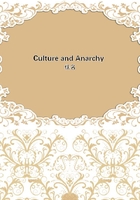
第69章
5 So that, for the sake of the present, but far more for the sake of the future, the lovers of culture are unswervingly and with a good conscience the opposers of anarchy. And not as the Barbarians and Philistines, whose honesty and whose sense of humour make them shrink, as we have seen, from treating the State as too serious a thing, and from giving it too much power,--for indeed the only State they know of, and think they administer, is the expression of their ordinary self. And though the headstrong and violent extreme among them might gladly arm this with full authority, yet their virtuous mean is, as we have said, pricked in conscience at doing this; and so our Barbarian Secretaries of State let the Park railings be broken down, and our Philistine Alderman-Colonels let the London roughs rob and beat the bystanders. But we, beholding in the State no expression of our ordinary self, but even already, as it were, the appointed frame and prepared vessel of our best self, and, for the future, our best self's powerful, beneficent and sacred expression and organ,--we are willing and resolved, even now, to strengthen against anarchy the trembling hands of our Barbarian Home Secretaries, and the feeble knees of our Philistine Alderman-Colonels; and to tell them, that it is not really in behalf of their own ordinary self that they are called to protect the Park railings, and to suppress the London roughs, but in behalf of the best self both of themselves and of all of us in the future.
6 Nevertheless, though for resisting anarchy the lovers of culture may prize and employ fire and strength, yet they must, at the same time, bear constantly in mind that it is not at this moment true, what the majority of people tell us, that the world wants fire and strength more than sweetness and light, and that things are for the most part to be settled first and understood afterwards. We have seen how much of our present perplexities and confusion this untrue notion of the majority of people amongst us has caused, and tends to perpetuate.
Therefore the true business of the friends of culture now is, to dissipate this false notion, to spread the belief in right reason and in a firm intelligible law of things, and to get men to try, in preference to staunchly acting with imperfect knowledge, to obtain some sounder basis of knowledge on which to act. This is what the friends and lovers of culture have to do, however the believers in action may grow impatient with us for saying so, and may insist on our lending a hand to their practical operations and showing a commendable interest in them.
7 To this insistence we must indeed turn a deaf ear. But neither, on the other hand, must the friends of culture expect to take the believers in action by storm, or to be visibly and speedily important, and to rule and cut a figure in the world. Aristotle says that those for whom alone ideas and the pursuit of the intelligible law of things can, in general, have much attraction, are principally the young, filled with generous spirit and with a passion for perfection; but the mass of mankind, he says, follow seeming goods for real, bestowing hardly a thought upon true sweetness and light;--'and to their lives,' he adds mournfully, 'who can give another and a better rhythm? 'But, although those chiefly attracted by sweetness and light will probably always be the young and enthusiastic, and culture must not hope to take the mass of mankind by storm, yet we will not therefore, for our own day and for our own people, admit and rest in the desponding sentence of Aristotle. For is not this the right crown of the long discipline of Hebraism, and the due fruit of mankind's centuries of painful schooling in self-conquest, and the just reward, above all, of the strenuous energy of our own nation and kindred in dealing honestly with itself and walking steadfastly according to the best light it knows,--that when in the fulness of time it has reason and beauty offered to it, and the law of things as they really are, it should at last walk by this true light with the same staunchness and zeal with which it formerly walked by its imperfect light? And thus man's two great natural forces, Hebraism and Hellenism, will no longer be dissociated and rival, but will be a joint force of right thinking and strong doing to carry him on towards perfection. This is what the lovers of culture may perhaps dare to augur for such a nation as ours.
8 Therefore, however great the changes to be accomplished, and however dense the array of Barbarians, Philistines, and Populace, we will neither despair on the one hand, nor, on the other, threaten violent revolution and change. But we will look forward cheerfully and hopefully to 'a revolution,' as the Duke of Wellington said, 'by due course of law;' though not exactly such laws as our Liberal friends are now, with their actual lights, fond of offering to us.
9 But if despondency and violence are both of them forbidden to the believer in culture, yet neither, on the other hand, is public life and direct political action much permitted to him.